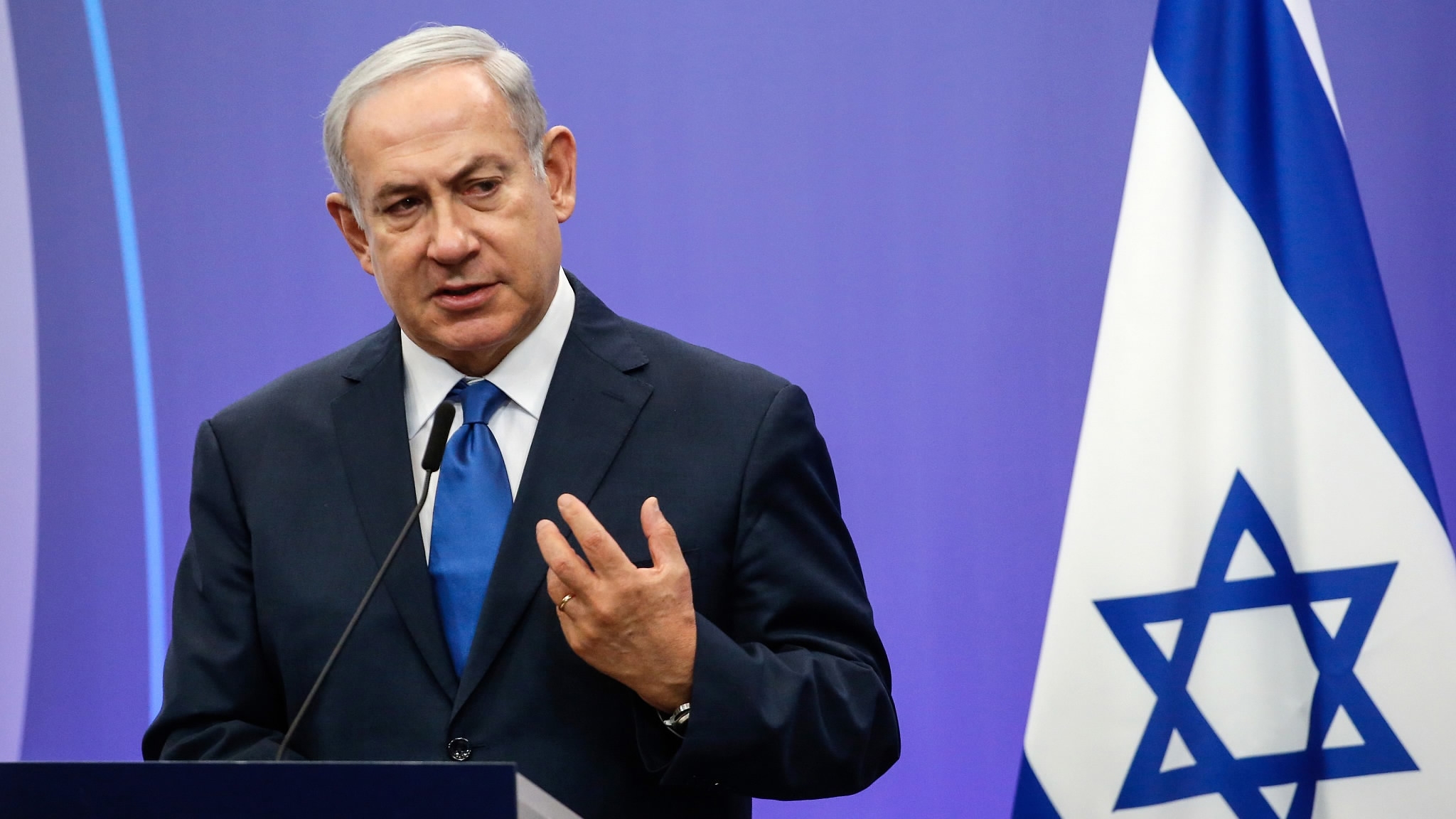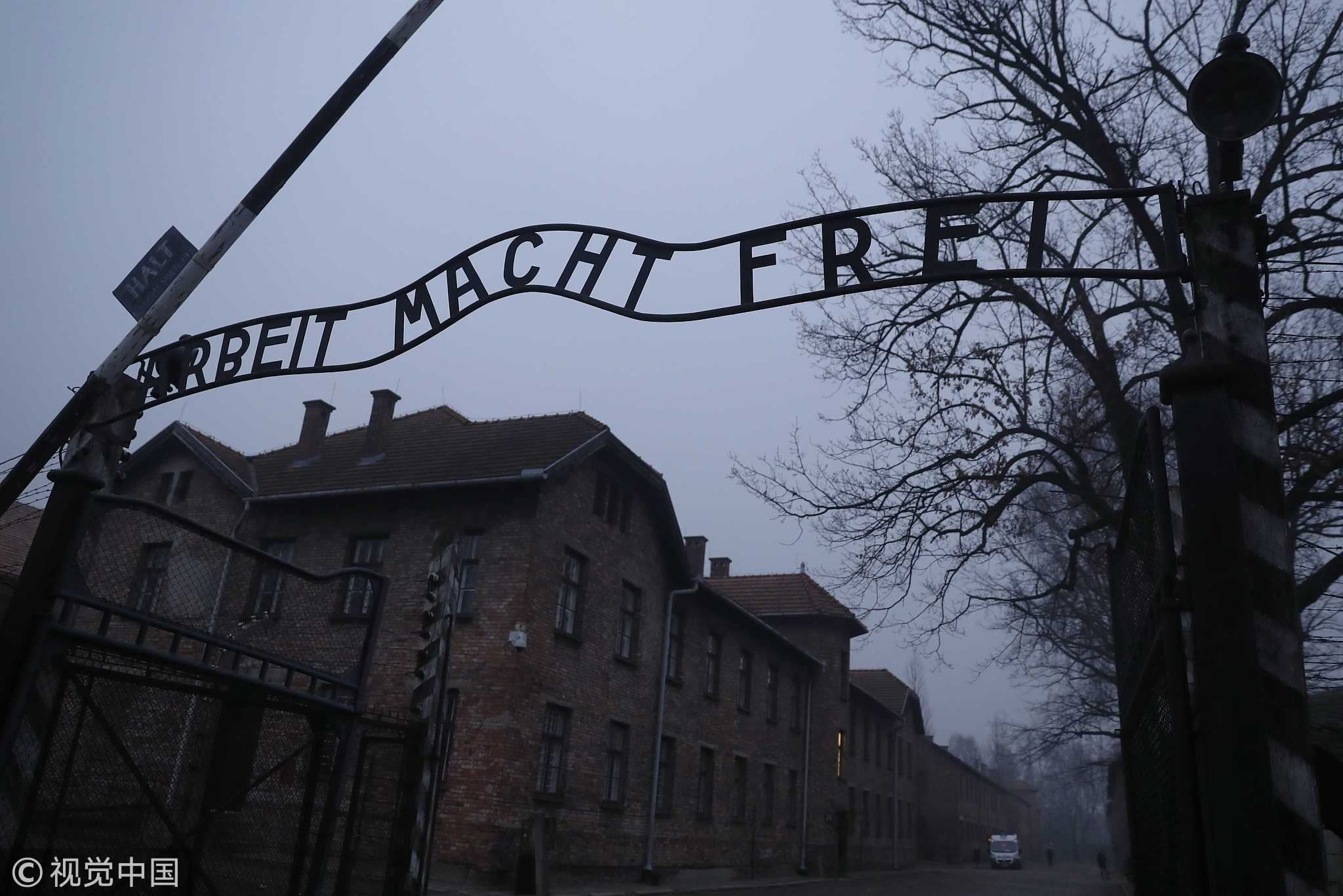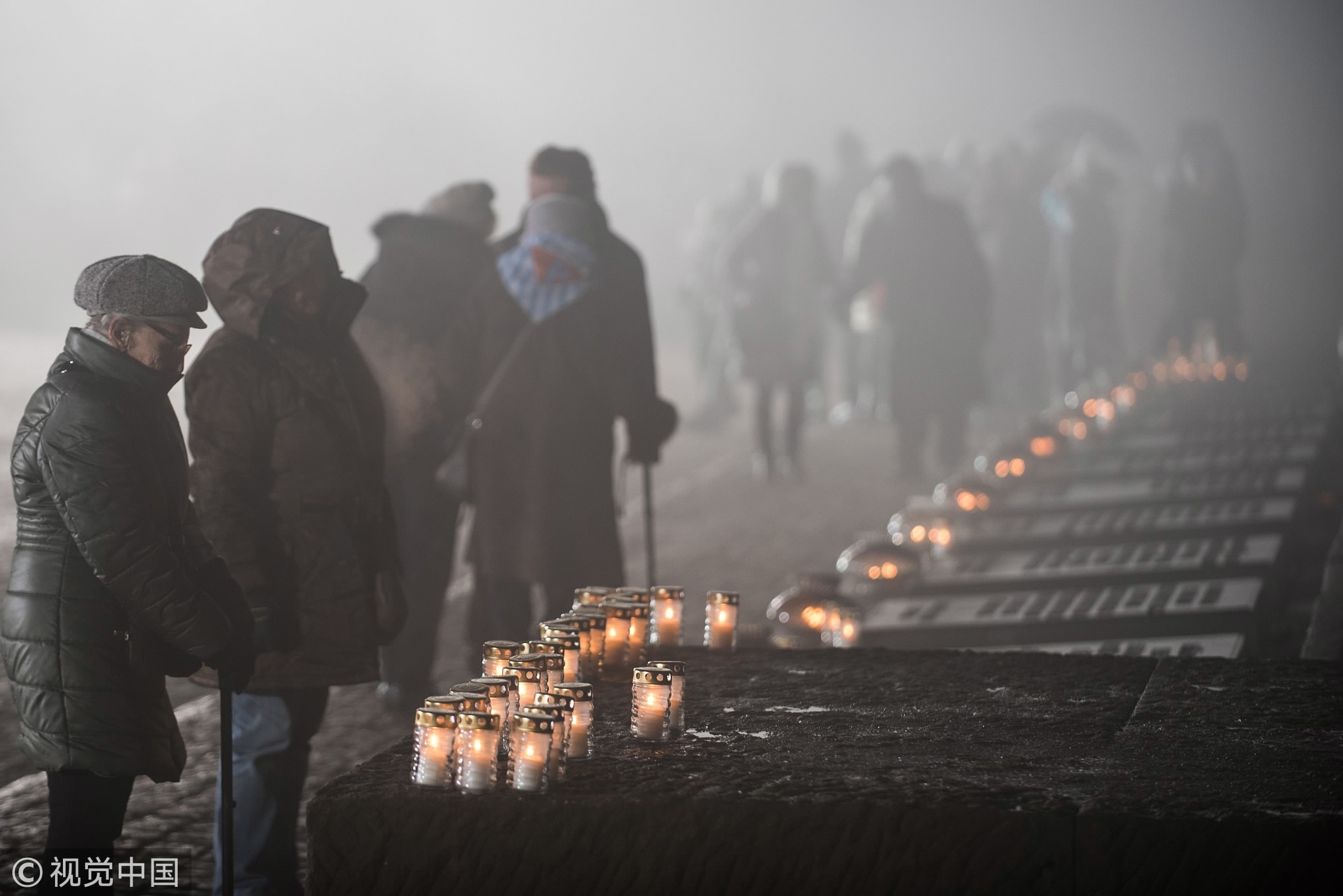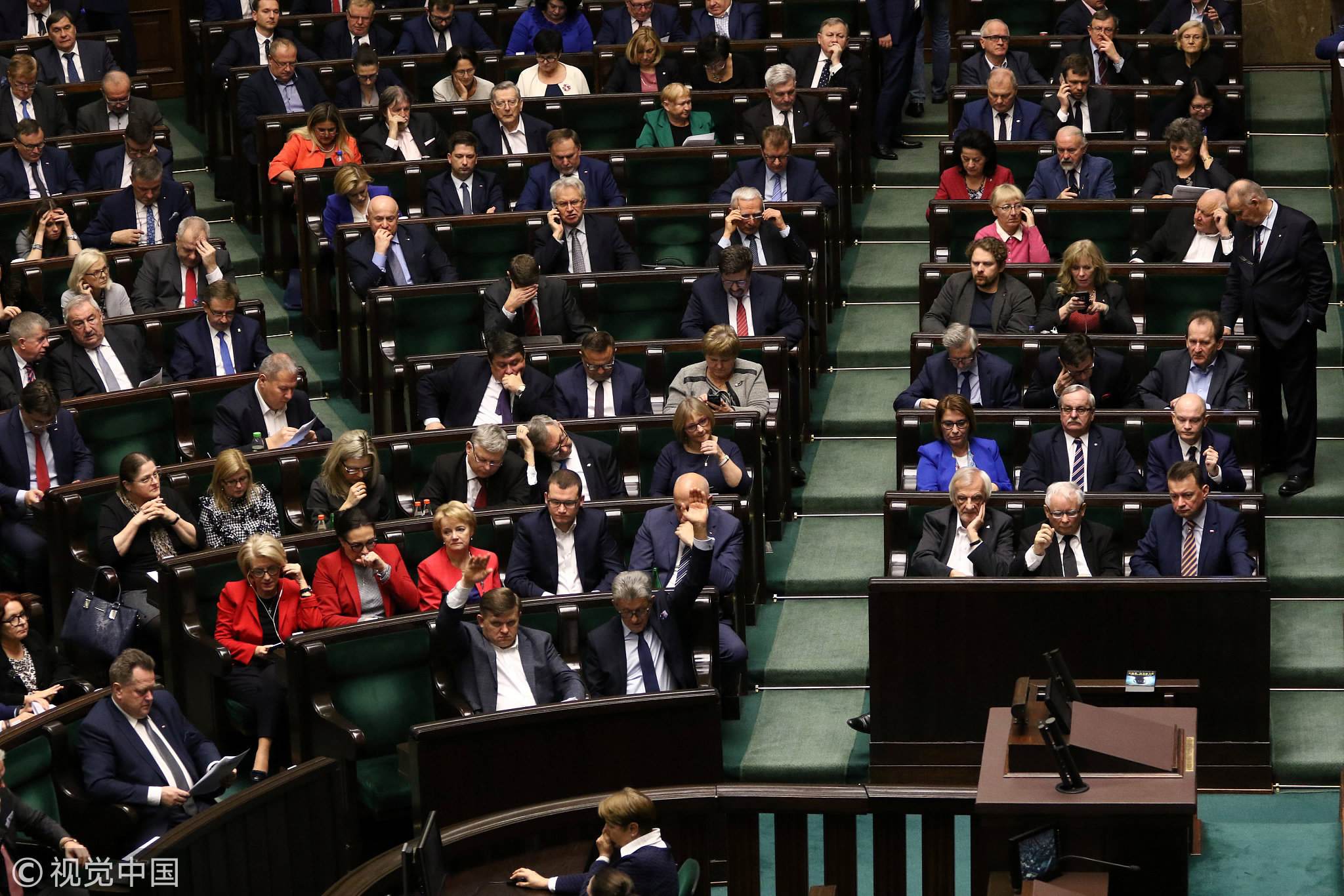
World
13:58, 28-Jan-2018
Israel slams Poland's new Holocaust bill as rewriting history
By Sim Sim Wissgott

Israel on Saturday accused Poland of trying to rewrite history with a new law that makes it illegal to describe Nazi death camps as Polish, as the world observed International Holocaust Remembrance Day.
The bill
Poland’s parliament passed a new law on Friday that calls for fines and up to three years in jail for anyone who refers to “Polish death camps” or uses terminology implying Poland was partly to blame for crimes committed by the Nazis during World War Two.
The bill is widely expected to get approved by the upper house of parliament before it is signed by the president.

The "Arbeit Macht Frei" gate at Auschwitz, during ceremonies marking the 73rd anniversary of the liberation of the camp and International Holocaust Victims Remembrance Day in Oswiecim, Poland, January 27, 2018. /VCG Photo
The "Arbeit Macht Frei" gate at Auschwitz, during ceremonies marking the 73rd anniversary of the liberation of the camp and International Holocaust Victims Remembrance Day in Oswiecim, Poland, January 27, 2018. /VCG Photo
The government in Warsaw argues death camps like Auschwitz, where millions of Jews were killed during the Holocaust, were built by Nazi Germany after it invaded Poland.
“Auschwitz-Birkenau is not a Polish name, and Arbeit Macht Frei is not a Polish phrase," Prime Minister Mateusz Morawiecki tweeted on Saturday, referring to the words that adorned the iron gate leading into Auschwitz, meaning “Work makes you free” in German.
Israeli reaction
Israel’s Prime Minister Benjamin Netanyahu was quick to hit back at the bill.
"The law is baseless. I strongly oppose it. One cannot change history and the Holocaust cannot be denied," he said in a statement Saturday.

Polish Prime Minister Mateusz Morawiecki speaks at Auschwitz-Birkenau near Oswiecim, Poland on International Holocaust Victims Remembrance Day, January 27, 2018. /VCG Photo
Polish Prime Minister Mateusz Morawiecki speaks at Auschwitz-Birkenau near Oswiecim, Poland on International Holocaust Victims Remembrance Day, January 27, 2018. /VCG Photo
Netanyahu added he had ordered Israel’s ambassador to Poland to meet with Morawiecki on Saturday evening to express his opposition to the new law.
Israel’s foreign ministry also said it had summoned Poland's charge d'affaires to Israel for Sunday.
The Polish law is "an attempt to rewrite and falsify history, something that the Jewish people and Israel will never accept," a ministry official was quoted as saying by AFP news agency.
Israeli MP and Yesh Atid party leader Yair Lapid was more scathing on Twitter, arguing that the new law “tries to deny Polish complicity in the Holocaust.”
“It was conceived in Germany but hundreds of thousands of Jews were murdered without ever meeting a German soldier. There were Polish death camps and no law can ever change that,” he wrote.

Survivors light candles at Auschwitz-Birkenau near Oswiecim, Poland, on International Holocaust Victims Remembrance Day, January 27, 2018. /VCG Photo
Survivors light candles at Auschwitz-Birkenau near Oswiecim, Poland, on International Holocaust Victims Remembrance Day, January 27, 2018. /VCG Photo
The Yad Vashem Holocaust memorial in Jerusalem agreed somewhat with Poland’s lawmakers that “the term 'Polish death camps' is a historical misrepresentation."
It opposed the bill however, arguing it was “liable to blur the historical truths regarding the assistance the Germans received from the Polish population during the Holocaust."
Poland and the Holocaust
Nazi Germany invaded Poland in 1939 and imposed a brutal occupation regime until the end of World War Two, which led to the deaths of some six million Poles. About three million were Jews.
Most of the Nazis’ extermination camps – notorious names like Auschwitz-Birkenau, Treblinka, Chelmno and Sobibor – were located in Poland.
At the same time, Poland also gave birth to the largest resistance movement under the Third Reich, with an estimated 300,000 fighters at its peak, providing intelligence to the Allies and carrying out sabotage operations against Nazi forces.

Parliament session in Warsaw, Poland, December 8, 2017 /VCG Photo
Parliament session in Warsaw, Poland, December 8, 2017 /VCG Photo
Lately, Poland's right-wing government, led by the Law and Justice party (PIS), has taken a hard stance against those who say the country was complicit in Nazi crimes.
Comments by former President Bronislaw Komorowski that Poland was also a “nation of perpetrators” have been slammed by his successor Andrzej Duda as an “attempt to destroy Poland’s good name.”
In 2012, the White House also had to issue an apology after President Barack Obama referred to “Polish death camps.” Poland’s then-foreign minister Radek Sikorski condemned the “outrageous error” as ignorant and incompetent.
Holocaust Remembrance Day
On Saturday, Morawiecki attended a commemoration ceremony at Auschwitz, on the 73rd anniversary of the camp’s liberation. The day has been known as International Holocaust Remembrance Day since 2006.

SITEMAP
Copyright © 2018 CGTN. Beijing ICP prepared NO.16065310-3
Copyright © 2018 CGTN. Beijing ICP prepared NO.16065310-3